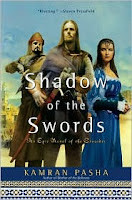 Shadow of the Swords
Shadow of the Swords by Kamran Pasha
390 pages
Published June 2010 by Simon Schuster Adult
Source: the publisher and FSB Associates
When Julie, from FSB Associates, contacted me about the possibility of reviewing
Shadow of the Swords, my initial reaction was to decline. I've got so many books that I need to get to and this one didn't necessarily sound like something that might trip my trigger. But then I got to thinking that I do know someone who is very much interested in the Crusades. So I asked Julie if she would mind getting the opinion of a very bright 18 year old. She was game and when the book arrived and I saw the cover, which looks so much like something out of the video games Mini-me is so fond of, he was eager to get started.
Synopsis from the publisher:
The epic story of the Crusades from the Muslim point of view.
Okay--that doesn't give you much to go on, does it?! So here's a synopsis from Publisher's Weekly:
The bloodshed of the Third Crusade is vividly portrayed in Pasha’s second novel (Mother of All Believers), an excellent swords and sandals saga that takes in the action from an early Islamic perspective. Richard the Lionheart leads the armies of the European Crusaders, while Saladin commands the Muslim forces in Palestine. Both men are cunning and ruthless, and both are victims of the wiles of a beautiful young Jewish woman’s plotting—one man as her lover, the other as an enemy. Miriam is the niece of Maimonides, Saladin’s trusted physician, and she has the power and will to thwart one man’s plans and save the kingdom of the other.
I asked Mini-me to jot down his thoughts on the book and imagined that we would sit down together and work them into a review. But I liked what he did so much, that I'm going to give you his thoughts, largely unaltered other than to add a few of his thoughts that he shared with me along the way.
Liked:
- I enjoyed the vivid imagery created by the author.
- The characterization was in-depth and gave me a sense of connection to each character.
- The character development was very [central] in this novel. Each character changed vastly from the beginning to the end as they learned and gained new experiences.
- I liked that Pasha showed the story from multiple religious points of view.
Disliked:
- Sometimes I felt as thought the descriptions were overly wordy, making the reading process a bit slower.
- I felt that certain characteristics were repeated when it was not entirely needed such as writing again and again about Miriam's eyes and hair or Saladin's honorable nature.
- Occasionally I felt the book read a little like a romance. [Mama's comment--bear in mind, here, that this is the opinion of a young man who's primarily focused on the action.]
Writing Style:
- I felt that for a novel set in the location that this book takes place in and for the time period involved, this writing style worked very effectively. Pasha made sure that the reader was aware of the setting in which each particular chapter was taking place.
[It's interesting that this is his view now. Early on he was telling me that he thought the book was, perhaps, overwritten. But evidently it began to work for him.]
Favorite Character:
- Maimondes was probably my favorite character. He was a character who faced many conflicts relating to his religious views, his morals and his family and friends. He was able to overcome these conflicts and learn from them even into his old age.
From the Prologue:
"They were supposed to have been safe. The coastline of Sinai was guarded by the Sultan's men. The handsome new Sultan who had swept into Cairo and overthrown its ailing king, ending the Shiite dynasty of the Fatimids and restoring Egypt to the fold of Sunni Islam. She should have been too young to understand these complex matters of state, but her father had always insisted that Jewish children should be well versed in the politics of the day. For it was the curse of her people that the changing winds of nations inevitably brought with them storms of tragedy and exile.
There had been many who had feared that the new Sultan would persecute the Jews for supporting the heretic kings who had ruled Egypt in defiance of the Caliph of Baghdad. But he had proven to be a wise man, and had reached out in friendship to the People of the Book. The Jews had found in the Sultan a patron and a protector, and her own uncle had been welcomed into the court as the ruler's personal physician.
How she wished her uncle had been with them today. Perhaps he could have saved them from the warriors of Christ who had descended on their caravan like locusts. Stanched the flow of blood from amputated limbs. Applied his special salves on the burns inflicted by flaming arrows. Maybe if he had been with them, the others would have lived. "
Thanks, Mini-me, for reading "Shadow of the Swords" and reviewing it!
 At last we come to the end of our readalong of Thrity Umrigar's The Space Between Us. It would be more accurate for me to say "Sadly" rather than "At last," to be honest. This was one of those books that you just don't want to reach the end of--and one that will stay with me.
At last we come to the end of our readalong of Thrity Umrigar's The Space Between Us. It would be more accurate for me to say "Sadly" rather than "At last," to be honest. This was one of those books that you just don't want to reach the end of--and one that will stay with me.




































